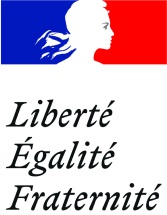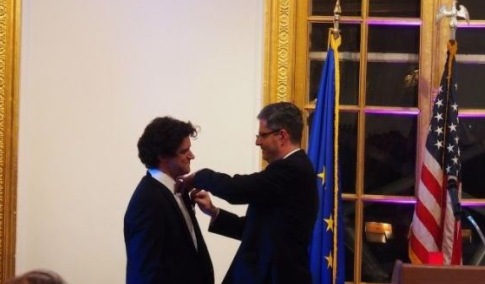On Thursday, February 26, 2015 H. E. François Delattre, Ambassador and Permanent Representative of France to the United Nations, honored Virgil de Voldère with the Order of Academic Palms in recognition of his major role in promoting French dual language education in New York City.
A former gallery owner, Virgil has been instrumental in helping to create French bilingual programs in New York City Public Schools. With the support of Education en Français à New York (EFNY) and the French American Cultural Exchange (FACE), Virgil led the initiative to found a bilingual program at PS 84. His “Road Map to Create a French Dual Language Program” has since been copied by other language communities around New York and the United States. Virgil is also the founder and director of La Petite Ecole, a French-language preschool that emphasizes the importance of the arts in education. He remains active in the education community through his leadership roles in EFNY, FACE and the Upper West Side Community Education Council.
____________________________
Cher Virgil,
Chère Susan, to whom I also want to pay tribute tonight,
Chère Madame (Mme Florence de Voldère, Virgil’s mother), Cher Monsieur (M. Philippe Vildieu, Virgil’s father)
Monsieur le Conseiller culturel adjoint, cher Thomas Michelon, whom I want to thank as well as the whole team of the Cultural service, for hosting us this evening.
Ladies and gentlemen,
Dear friends, chers amis,
I am honored and delighted to be with you this evening as we celebrate the accomplishments of one of France’s best champions in America. The Embassy team and I are deeply indebted to you Virgil, for all you have done and are continuing to do to give French its rightful place in New York City classrooms. Thanks to you Virgil, a whole new generation of Francophones has been created in one of America’s greatest cities.
In the US, the term “grass roots initiative” would be the best way to describe how the bilingual revolution came about. With Virgil, I think, it has gone even further. He is the one who has planted the seed that has since turned into a beautiful lawn. And I hope that you don’t take this lightly, Virgil – you know how we French people love our lawns. I’m sure you already know this, though, having attended the École Alsacienne in Paris, steps away from the Jardin du Luxembourg.
Before I go any further, I would like to say a few words about the award that I am about to bestow on Virgil. The Order of Academic Palms was founded in 1808 by Napoleon Bonaparte as an award for devotion and accomplishment in the areas of teaching, scholarship and research. It is one of France’s highest awards and certainly one of our most important, especially when it is given to someone with the younger generations’ interests in mind.
As you have all come tonight to show your support and admiration for Virgil, I would like to recognize Talcott Long, of Education en Français à New York, and Dr. Fabrice Jaumont, our Education Attaché here at the Embassy. You too are key players of the bilingual revolution I was referring to. With 750 million people predicted to speak French worldwide by 2050, your shared vision represents a crucial step forward in educating tomorrow’s citizens.
At the risk of preaching to the choir, I’d like to mention a few of the advantages that come with bilingualism, because it is a cause that I too am passionate about. Learning another language has been linked to improvement in many cognitive functions, from better memory to superior problem-solving skills. It helps develop a positive sense of self-identity and increase cultural awareness for everyone.
As for learning French, I hardly need mention that it is a key language of international relations, business and the arts. As France’s Ambassador to the United Nations, I can tell you that French is one of the most spoken languages in the world of diplomacy and one of the two working languages at the United Nations. And yet, despite their importance, the demand for bilingual language programs far outstrips supply. In New York alone, only 3,000 Francophone children have access to such a program out of a population of 22,000 children! It means that there is a huge potential for growth.
Of course, every transformation needs to start somewhere. In our case, we have the reason sitting right in front of us, or rather, the two reasons sitting in front of us. Atlas and Cyrus, you are lucky to have such engaged parents! It was partly out of desire to have his children educated in a bilingual environment that in 2008 Virgil launched his project that would lead him to where he is today.
At that time, Virgil, you were continuing in the family tradition of running a gallery representing contemporary artists of international renown. This space in Chelsea had grown out of the aptly-named Slingshot project, an earlier ambition of yours to launch emerging artists onto the scene via shows in non-traditional exhibitions.
Actually that’s how we met, almost ten years ago, when I was the Consul General in New York. Each time I had a minister in town, you very kindly offered to organize a visit in Chelsea. That was so much appreciated. Since then we discovered that our families knew each other.
Art is a family business – or a family passion – chez les Voldère. Both Virgil’s father and grandfather were well-known galeristes, but that didn’t stop Virgil from taking his passion for this subject in an entirely new direction. Before we explore the didactic possibilities of art, though, I’d like to revisit his activities at PS 84, a truly watershed moment for bilingualism.
The time is 2007; the place, the Upper West Side. Susan and Virgil wanted their first son, Atlas, to be in an all-French environment for kindergarten next year. The neighborhood school, on West 92nd Street, did not offer anything of the sort. His first port of call was EFNY (Education en Français à New York), which at that time was still flush from its bilingual victory at PS 58 in Brooklyn. There Virgil met Talcott and later Fabrice, his comrades-in-arms in the bilingual revolution.
The challenges facing them were formidable: they had to enlist enough parents who might be interested in this option and would be able to state their case to the principal. As it happens, they found a very sympathetic supporter in the principal of PS 84, Robin Sundick, who I am very glad to see in the audience today.
Mrs. Sundick was an early proponent of dual language programs: in fact; she even oversaw the creation of a Spanish program in her school a few years prior to our campaign.
By this point, Virgil had already begun to formulate in his head the “Road Map to Create a French Dual Language Program.” This document has since become the “manifesto” of our cause. Not only has it been used in efforts to create French programs downtown and in other boroughs, it has also served as a model for other language groups who want to follow our lead. Since we started distributing this plan, Japanese and Italian communities in Brooklyn have started their own programs.
Our Education Department has even gotten word of several movements to create French Immersion Schools in California, Texas, Utah, and even, Alaska! This was one of my top priorities when I was France’s Ambassador to Washington.
Virgil, through your efforts, I believe that we have been able to tap into a current in American society that runs deeper than a parent’s concern for their child’s education, as important as that may be.
Thanks to our long history as allies and our common values, there has always been an affinity in the United States for all things French. France’s ideas, her culture, her way of seeing the world have always found an eager audience on this side of the Atlantic – and you know the long tradition of French modesty… This upwelling of enthusiasm by parents to have their children learn French is, I think, one of the most tangible expressions of this rapport. Bravo, Virgil, for having known to “capitalize” on this fascination – which, let me assure the Americans in the audience, is completely mutual!
But what has our dear friend been doing since the smashing success of PS 84? I think the better question is: what hasn’t he been doing? As a Board Member of EFNY, a liaison for FACE, and an elected Council Member of the Upper West Side Community Education Council, he remains closely involved in the bilingual cause. I can just imagine him now, strategizing and scheming with fellow revolutionaries on miniature chairs and cushions at La Petite Ecole, his latest venture, opened in 2010.
As legend would have it, this French immersion preschool was born out of a desire to give other children the chance to grow up like his own two sons in an art-filled, French-speaking environment. Rousseau wrote in Emile, – I quote – “Although memory and reason are wholly different faculties, the one does not really develop apart from the other. Before the age of reason the child receives images, not ideas; and there is this difference between them: images are merely the pictures of external objects, while ideas are notions about those objects determined by their relations.”
Thus, an image-rich environment such as the one provided by Virgil is a marvelous complement to the rigors of learning a new language, especially at the age of three or four.
What I also find extraordinary at La Petite Ecole is that real artists are teaching the children. It is a novel concept and very well conceived, since, after all, who is better equipped to develop children’s expressive capabilities?
I have no doubt that Virgil’s idea will be replicated elsewhere like his bilingual program. It is thanks to the vision of people like him that we are standing at the dawn of a new era, an era in which education is finally catching up to the demands of a globalized world.
Dear Virgil,
It is now my honor to present you with the Order of Academic Palms in recognition of your endless energy, your collaborative spirit and your unwavering commitment to the cause of bilingual education.
Virgil de Voldère, au nom du gouvernement français, je vous fais Chevalier dans l’Ordre des Palmes Académiques.



